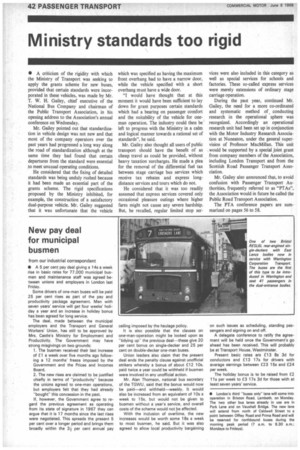Ministry standards too rigid
Page 44

If you've noticed an error in this article please click here to report it so we can fix it.
• A criticism of the rigidity with which the Ministry of Transport was seeking to apply the grants scheme for new buses, provided that certain standards were incorporated in these vehicles, was made by Mr. T. W. H. Gailey, chief executive of the National Bus Company and chairman of the Public Transport Association, in his opening address to the Association's annual conference on Wednesday.
Mr. Gailey pointed out that standardization in vehicle design was not new and that most of the company operators over the past years had progressed a long way along the road of standardization although at the same time they had found that certain departures from the standard were essential to meet unusual operating conditions.
He considered that the fixing of detailed standards was being unduly rushed because it had been made an essential part of the grants scheme. The rigid specifications proposed by the Ministry inhibited, for example, the construction of a satisfactory dual-purpose vehicle. Mr. Gailey suggested that it was unfortunate that the vehicle which was specified as having the maximum front overhang had to have a narrow door, while the vehicle specified with a short overhang must have a wide door.
"I would have thought that at this moment it would have been sufficient to lay down for grant purposes certain standards which had a bearing on passenger comfort and the suitability of the vehicle for one. man operation. The industry could then be left to progress with the Ministry in a calm and logical manner towards a rational set of standards", he said.
Mr. Gailey also thought all users of public transport should have the benefit of as cheap travel as could be provided, without heavy taxation surcharges. He made a plea for the removal of the differential fuel tax between stage carriage bus services which receive tax rebates and express longdistance services and tours which do not.
He considered that it was too readily assumed that express services covered only occasional pleasure outings where higher fares might not cause any severe hardship. But, he recalled, regular limited stop ser
vices were also included in this category as well as special services for schools and factories. These so-called express services were merely extensions of ordinary stage carriage operation.
During the past year, continued Mr. Gailey, the need for a more co-ordinated and systematic method of conducting research in the operational sphere was recognized. Accordingly an operational research unit had been set up in conjunction with the Motor Industry Research Association at Nuneaton, under the general supervision of Professor MacMillan. This unit would be supported by a special joint grant from company members of the Association, including London Transport and from the Scottish Road Passenger Transport Association.
Mr. Galley also announced that, to avoid confusion with Passenger Transport Authorities, frequently referred to as "PTAs", the Association would in future be called the Public Road Transport Association.
The PTA conference papers are summarized on pages 56 to 58.


























































































































